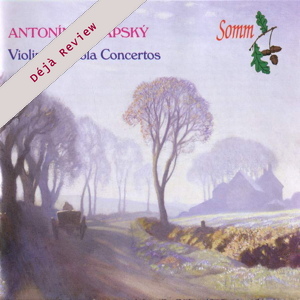
Déjà Review: this review was first published in September 2002 and the recording is still available.
Antonín Tučapský (1928-2014)
Violin Concerto (1993)
Viola Concerto (1996)
Víteszlav Kuzník (violin)
Pavel Peřina (viola)
Janacek PO/Petr Vronský
Prague SO/Elli Jaffe
rec. 1999/2000, Smetana Hall, Prague
SOMM Recordings SOMMCD 221 [57]
Tučapskýwas born not far from Brno during the inter-war years and it was at Brno that he studied. One of his teachers was Jan Kunc, himself a pupil of Janáček and Novák. When in 1972 he met and married the English soprano Beryl Musgrave, professional life in Czechoslovakia became impossible such was the political environment. The couple moved to London in 1975. His compositions (many choral items) have been published by Thames since then. Somm have also taken up his cause with various choral recordings including SOMMCD205.
You might well know Tučapský’sname from his prodigious choral output but as this disc confirms he is by no means an exclusively choral practitioner. We need to watch his name and music as closely as we should have watched that of Hans Gál, Roberto Gerhard, Berthold Goldschmidt and Karl Rankl – not that his music can be likened to any of these composers; certainly they do not form any ‘school’.
The Violin Concerto was not written to commission. Tučapskýstands clear of the neo-classical stream unlike his compatriot Ondrej Kukal whose violin concerto (Panton) I recall reviewing a couple of years back. Tučapskýtakes the way of knowing fantasy. This is music for grown-ups; not hard-going in the avant-garde or atonal senses – it is rather an extension of Prokofiev’s First Violin Concerto melded with quasi-exotic streams from Szymanowski and Miklós Rózsa. Tučapskýscales touching nostalgic heights in the adagio serio. The solo part is extremely virtuosic with some delightful ‘neighing’ effects. Fairytale fantasy is the order of the day.
The Viola Concerto was written at the request of Martin Outram, principal viola of Ronald Corp’s New London Orchestra. Tučapskýhas been much associated with both Corp and this orchestra. The work has the brightness of the Violin Concerto and some of its mannerisms. The viola is in an almost incessant spate of song. The invaluable notes by Somm regular, Graham Melville-Mason, tell us that the second movement carries inflections of sorrow and nostalgia following the split of the Czech Republic and Slovakia in 1993. It is the most sustained emotional statement on the disc. The helter-skelter switchback finale illustrates Tucapsky’s brilliant way with the percussion – something also evident in the Violin Concerto. This movement also carries the legacy of the andante in its great swooning violin slides (1.43). It ends in a warmly bathed hymnal of jubilation – a Martinů-like joyous glow. Wonderful stuff.
I will now be on the lookout for his Rondo for horn and strings (1953), Fantasia quasi una sonata for piano (1982), Concertino for piano and strings (1991), the oratorio Stabat Mater (1989), cantata Mary Magdalene (1991) and his sole opera The Undertaker (a Pushkin story) (1988 and premiered in London in 1993).
This is a covetable CD – the sort of disc which makes reviewing ‘peripheral’ repertoire a joy. With its nostalgia and surreal fantasy I shall be returning to these concertos again.
Rob Barnett
Help us financially by purchasing from



















